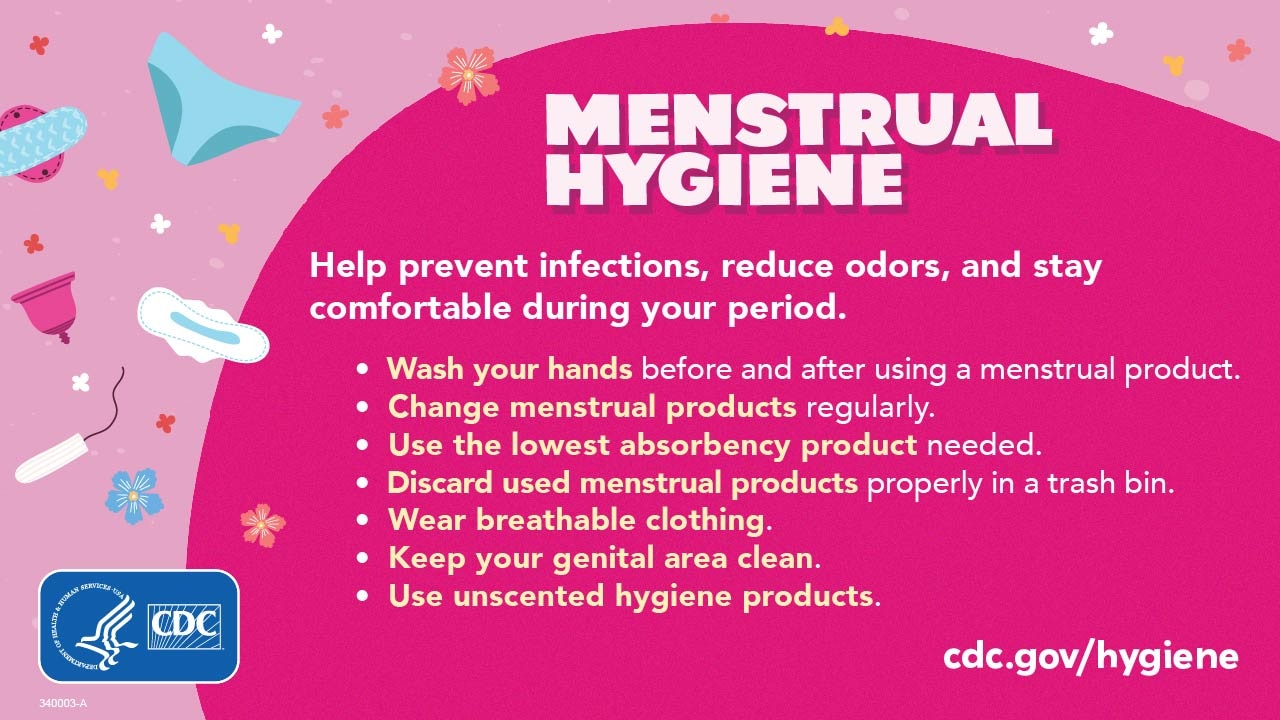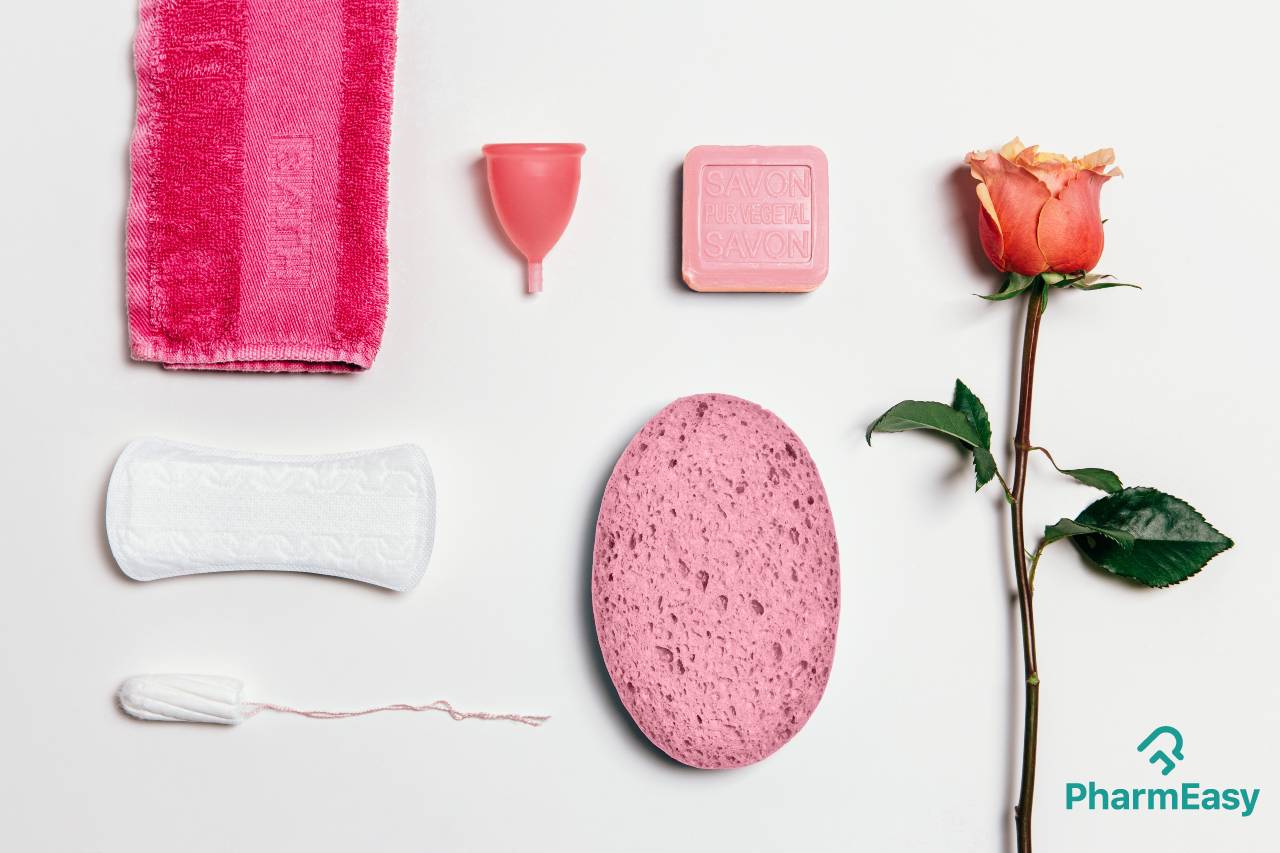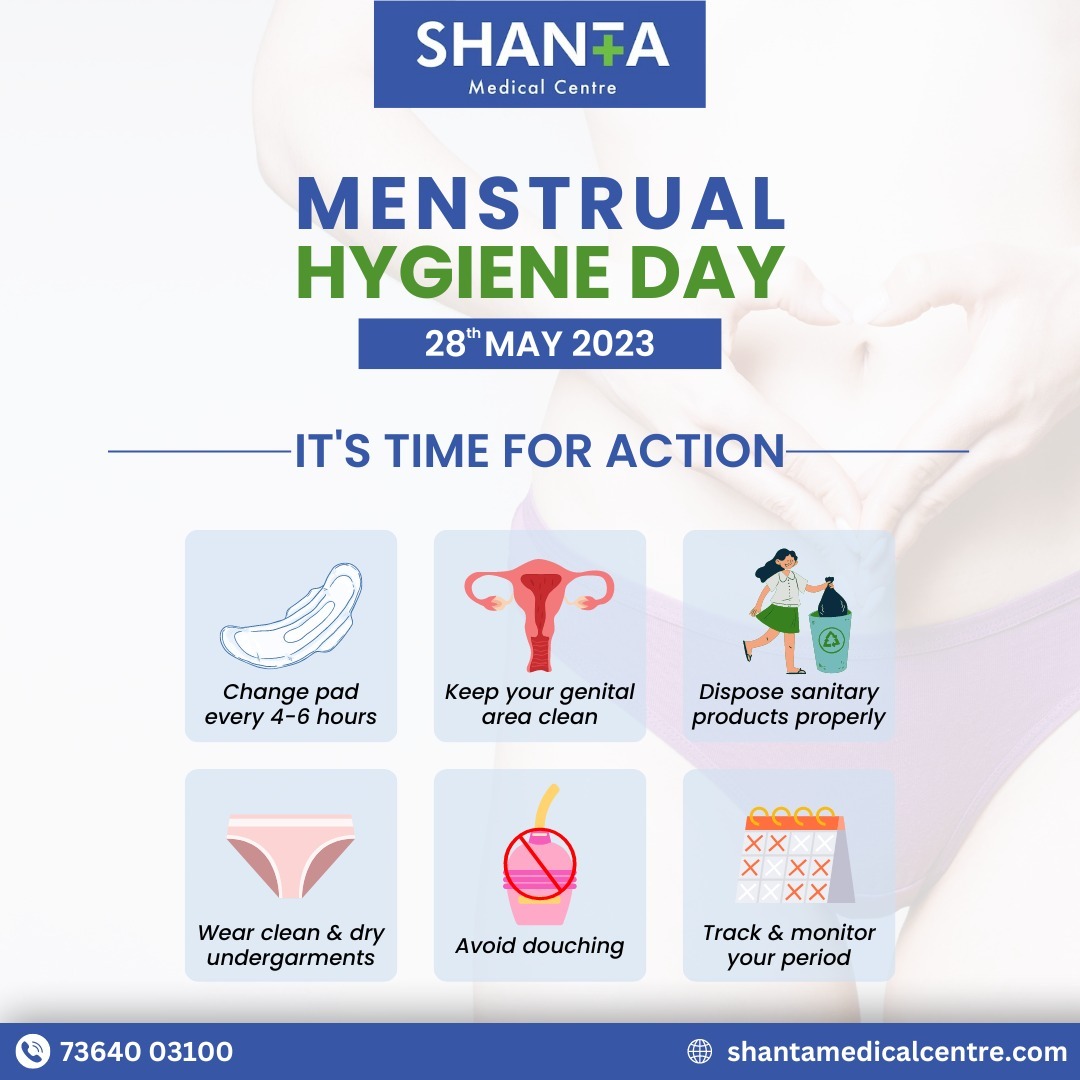To maintain hygiene during your period and stay clean, wear lightweight, cotton underwear, wash your hands before and after changing period protection, and change your protection often according to your menstrual flow. Avoid using scented toilet paper, tampons, or pads, and don’t wash your vagina and vulva too thoroughly.
It’s important to shower at least once a day, more frequently if you’re working out or feel the need to. Remember to track your period and not to change your tampon infrequently. Practicing good hygiene during your period can prevent odors, and taking a warm bath can help relax your abdominal muscles and ease cramps.

Credit: www.cdc.gov
Understanding Period Hygiene
When it comes to maintaining good hygiene during your period, it’s essential to understand the importance of cleanliness and the effects that menstruation can have on your hygiene routine.
Importance Of Good Hygiene
Good hygiene is crucial during your period to prevent any potential infections or discomfort. When you menstruate, your body sheds blood and tissue, creating a warm and damp environment that can be a breeding ground for bacteria. By practicing good hygiene habits, you can keep yourself feeling fresh and clean, minimizing any potential risks.
- Wear lightweight, cotton underwear: Opt for breathable materials like cotton to allow proper air circulation and reduce moisture buildup.
- Wash your hands: Before and after changing your period protection, make sure to wash your hands thoroughly with warm water and soap to avoid any cross-contamination.
- Change protection often: It’s important to change your pads, tampons, or menstrual cups regularly, depending on your flow. This prevents bacteria buildup and helps to prevent any unpleasant odors.
Effect Of Periods On Hygiene
During your period, there are a few specific challenges that can affect your hygiene routine. Understanding and addressing these challenges can help you maintain cleanliness and comfort throughout your menstrual cycle.
- Menstrual odor: Menstrual blood can have a distinct odor, especially when exposed to air. By changing your period products regularly and maintaining good hygiene practices, you can help minimize any unwanted smells.
- Period stains: It’s common to experience occasional leaks or staining during your period. To prevent stains from setting in, it’s important to act quickly and rinse the affected clothing with cold water before washing.
- Personal care: Taking care of your personal hygiene, such as washing your genitals with mild soap and warm water, can help you feel fresh and clean during your period.
By understanding the importance of good hygiene and being aware of the effects that periods can have on cleanliness, you can stay clean, comfortable, and healthy throughout your menstrual cycle. Remember to prioritize hygiene by following these simple but effective practices.

Credit: pharmeasy.in
Maintaining Cleanliness
To maintain cleanliness during your period, change your protection often and in line with your menstrual flow, wash your hands before and after changing, and wear lightweight, cotton underwear. It’s important to shower at least once a day, more often if working out or feeling the need.
Avoid scented products, and practice good hygiene for comfort and health.
Menstrual Product Management
To maintain cleanliness during your period, proper management of menstrual products is essential. Whether you prefer tampons, menstrual cups, or pads, here are some tips to keep in mind: 1. Change Regularly: It’s important to change your menstrual product regularly to avoid leakage and discomfort. Aim to change tampons every 4-8 hours and pads every 3-4 hours, or as needed based on your flow. 2. Disposing of Hygiene Products: Proper disposal of used products is crucial for maintaining cleanliness. Wrap used pads and tampons in toilet paper before disposing of them in a waste bin. Alternatively, consider using biodegradable or eco-friendly options for a more sustainable approach. 3. Sterilizing Menstrual Cups: If you use a menstrual cup, ensure proper sterilization before and after each use. Follow the instructions provided by the cup manufacturer for the appropriate cleaning method.Personal Hygiene Practices
Maintaining personal hygiene during your period is essential for staying clean and fresh. Here are some personal hygiene practices to consider: 1. Wash Regularly: Keep your intimate area clean by washing it with lukewarm water and a gentle, pH-balanced intimate wash. Avoid using strong soaps or perfumed washes, as they can disrupt the natural pH balance and cause irritation. 2. Hand Hygiene: Always wash your hands before and after changing your menstrual product to prevent the spread of bacteria. Use soap and water or hand sanitizer when water is not available. 3. Bedtime Routine: Protect your sheets and mattress by placing a clean towel or a waterproof bedsheet underneath you while sleeping. This can help prevent stains and keep your bed clean. Remember, maintaining cleanliness during your period is crucial for your overall well-being and comfort. Following these menstrual product management tips and personal hygiene practices will help you feel fresh and confident throughout the day.Essential Hygiene Tips
Proper hygiene during your period is crucial for maintaining comfort, preventing infections, and ensuring overall wellbeing. Here are essential hygiene tips to keep it clean during your period.
Choosing The Right Products
When it comes to selecting period products, it’s essential to choose options that suit your flow, lifestyle, and comfort. Here’s what you need to consider:
- Menstrual Cups: Consider using a menstrual cup, a reusable and eco-friendly option that provides reliable protection without the risk of chemicals.
- Pads: Opt for pads with breathable materials and adequate absorption to keep you feeling fresh and dry.
- Tampons: If you prefer tampons, ensure you choose the right absorbency level for your flow, and remember to change them regularly.
Hygiene Practices For Comfort
Adopting proper hygiene practices can significantly enhance your comfort during menstruation. Here are some key hygiene practices to follow:
- Regular Changing: Change your pads or tampons every 4-6 hours, or as needed, to prevent odor and bacterial overgrowth.
- Personal Hygiene: Maintain proper cleanliness by washing your external genital area with mild, unscented soap and water, and ensure thorough drying to prevent irritation and infections.
- Hygiene Disposal: Dispose of used hygiene products in a sanitary manner, following the manufacturer’s recommendations or local waste disposal guidelines.
Hygiene Faqs
When it comes to maintaining cleanliness during your period, having proper hygiene practices is essential. To help you navigate through common concerns and questions, we have compiled a list of frequently asked questions regarding hygiene during menstruation. In this section, we will address topics such as showering frequency and common hygiene mistakes to ensure you have all the information you need to keep it clean during your period.
Showering Frequency
During your period, it is important to pay attention to your personal hygiene, including showering. Showering regularly helps to keep you feeling fresh and clean. But how frequently should you shower while on your period? The answer depends on various factors, such as your activity level and personal comfort.
If you are engaged in activities that cause you to sweat or feel unclean, it is recommended to shower at least once a day. This will help wash away any accumulated menstrual blood and prevent any unpleasant odor. However, if you have a light flow and do not engage in vigorous activities, showering every other day may be sufficient. Remember, personal preference plays a role in determining how often you shower during your period.
Common Hygiene Mistakes
While maintaining good hygiene is important during your period, it’s essential to avoid common mistakes that can compromise your cleanliness and overall health. Here are some common hygiene mistakes to be aware of:
- Using scented toilet paper, tampons, or pads: These products may contain harsh chemicals that can disrupt the natural pH balance of your vagina, leading to discomfort or infections. Opt for unscented options instead.
- Delaying medication for menstrual cramps: If you experience severe cramps, it is important to take appropriate pain relief medication as advised by your healthcare provider. Don’t wait until the pain becomes unbearable.
- Skipping period tracking: Keeping track of your menstrual cycle is important for managing your period. It allows you to anticipate when your period will start, ensuring you are prepared with the necessary hygiene products.
- Over-cleaning your vagina and vulva: While it’s important to clean your intimate area, overdoing it can disrupt the natural balance of the vaginal flora. Stick to gentle cleansing with mild, unscented soap and avoid douching or using harsh cleansers.
- Not using protection during intercourse: Though it may seem obvious, it’s worth mentioning that you should continue to use protection, such as condoms, during your period to prevent unwanted pregnancies and reduce the risk of sexually transmitted infections.
- Infrequent tampon changes: Regularly changing your tampons is crucial to prevent bacterial growth and minimize the risk of toxic shock syndrome. Follow the manufacturer’s guidelines and change your tampon every 4 to 8 hours or as needed.
- Giving in to cravings: While it’s natural to have food cravings during your period, try to maintain a balanced diet. Opt for healthy choices like dark chocolate, leafy vegetables, ginger, and salmon, and stay hydrated by drinking plenty of water.
By avoiding these common hygiene mistakes, you can ensure a clean and comfortable period experience. Remember to listen to your body and adapt your hygiene routine based on your individual needs and comfort level.
Expert Advice
Maintain cleanliness and hygiene during your period with expert advice. Learn tips on changing regularly, cleaning well, and disposing of hygiene products properly. Stay comfortable and healthy by wearing lightweight, cotton underwear and washing your hands before and after changing protection.
Cdc Recommendations
When it comes to maintaining proper hygiene during your period, it’s important to follow the expert advice provided by reputable sources such as the Centers for Disease Control and Prevention (CDC). They recommend the following:
- Wearing lightweight, cotton underwear for better airflow.
- Washing your hands before and after changing period protection to prevent the spread of bacteria.
- Changing your period protection often, in accordance with your menstrual flow, to avoid infections.
Summer’s Eve Tips
In addition to the CDC recommendations, Summer’s Eve, a trusted brand in feminine hygiene, offers some helpful tips to keep it clean during your period:
- Use pH-balanced feminine wash or wipes to cleanse your intimate area gently.
- Avoid using scented toilet paper, tampons, or pads as they can disrupt the natural pH balance and cause irritation.
- Stay hydrated by drinking plenty of water, which can help flush out toxins and keep your body clean.
- Regularly change your bedding and towels to prevent the accumulation of bacteria and odors.
- Engage in regular hand hygiene by washing your hands thoroughly before and after handling menstrual products.
By following these recommendations and tips, you can maintain optimal cleanliness and comfort during your period.

Credit: shantamedicalcentre.com
Frequently Asked Questions Of How To Keep It Clean During Your Period
How Do You Stay Clean On Your Period?
To stay clean on your period, follow these tips: wear lightweight, cotton underwear, wash hands before and after changing protection, change protection often based on flow, avoid scented products, track your period, do not wash too thoroughly, and maintain good hygiene.
Shower daily, especially if sweaty or working out, and avoid scented products, taking medication when needed, and changing tampons infrequently.
How Often Should I Shower On My Period?
During your period, it is best to shower at least once a day to maintain hygiene. Consider showering more frequently if you are physically active or feel the need.
What Should You Not Do On Your Period?
During your period, you should not use scented toilet paper, tampons or pads. Avoid waiting to take medications for cramps. Do not skip tracking your period. Avoid washing your vagina and vulva too thoroughly. Don’t forget to use condoms during your period.
Change your tampon regularly and do not let cravings control your eating habits.
Is It Okay To Wash Yourself During Periods?
Yes, it is okay to wash yourself during periods. Practicing good hygiene during your period can prevent odors. A warm bath can also help relax abdominal muscles and ease cramps.
Conclusion
In order to maintain good hygiene during your period and keep yourself comfortable and healthy, it’s important to follow simple yet essential practices. Ensure to change your period protection frequently, wash your hands before and after, and wear lightweight, cotton underwear.
Practicing good hygiene is key to preventing odors and promoting overall health during your period.